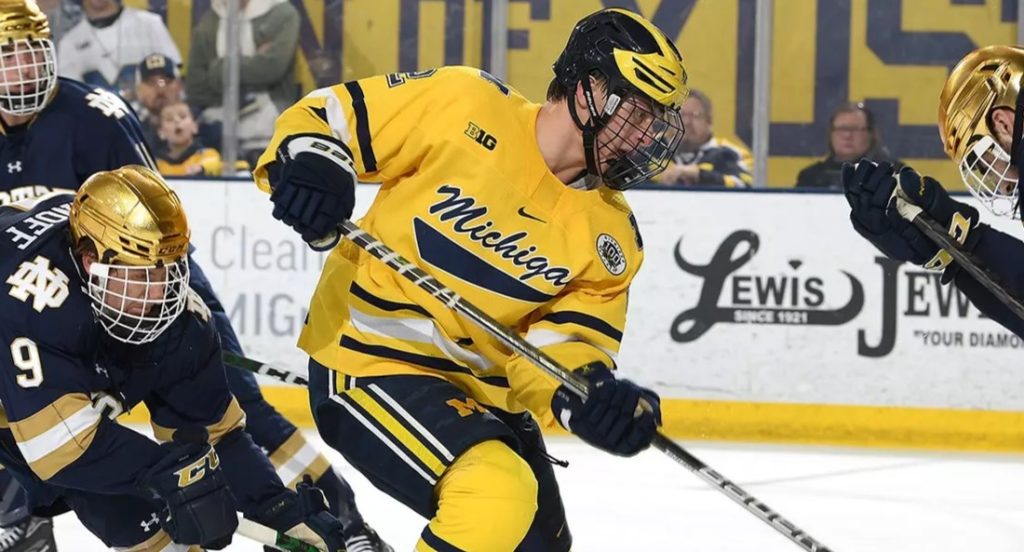
This is the third of four previews for teams playing in the 2023 NCAA Men’s Frozen Four this week in St. Paul, Minn. Click here for all of USCHO’s Frozen Four coverage.
Michigan Wolverines
How they got to St. Paul: Won the Maryland Heights Regional, beating North Dakota 4-3 and Michigan State 5-2
Top players: F Gavin Brindley (25-28-53), F Dylan Duke (26-23-49), T.J. Hughes (19-29-48), Rutger McGroarty (16-36-52), D Seamus Casey (7-38-45)
Top goalie: Jacob Barczewski (20-13-3, 2.81 GAA, .909 SV%)
Why they’ll win a national championship: More than any other team in this field, the Wolverines have something to prove. The only team to reach the Frozen Four as something other than a No. 1 regional seed, Michigan feels like it was counted out all along. The Wolverines are battle tested, making their third consecutive Frozen Four appearance. They’re fast, they’re gifted offensively, and their defense is gelling at just the right time of the season.
Why they won’t win a national championship: As good as they are up front, the Wolverines can still allow a lot of goals. There’s little advantage to averaging four or more goals in a game if you also allow five, as Michigan has done 10 times this season. For the past two years, the Wolverines have relied on their lethal offense to compensate for everyone else’s scoring chances, but as they found out against Quinnipiac last year, that’s not something that can be relied upon in the Frozen Four.
Michigan is a team with something to prove.
“I think a lot of people counted us out four or five weeks ago,” said Wolverines coach Brandon Naurato, “and all of the guys believed in the resiliency of this group to get back to where we believe that we should be.”
Where they are now is where the Wolverines have been for the last two consecutive years, in the Frozen Four. Those previous trips resulted in semifinal losses to the eventual national champion, to Denver in 2022 and Quinnipiac last season.
As recently as a month ago, the Wolverines were a PairWise bubble team. Following a 6-2 road loss to Minnesota March 1, the team had a moment of reckoning.
“We had an honest conversation with the guys about what it takes to win at this time and people being all in and then just going out and earning it,” said Naurato. “We didn’t like the effort that game, but we’ve kind of turned the corner since then.”
Michigan picked up a 6-5 overtime win against the Gophers the following night and went on a 6-1-0 run, the only loss 5-4 in overtime to Michigan State in the Big Ten playoff championship game.
Naurato calls the Big Ten playoffs the real turning point for a Michigan team that finished fourth in conference play, a team that was oh-so-close in so many games throughout the season.
“We’ve been playing good hockey all year, but for whatever reason, the other team was getting the bounce instead of us,” said Naurato. The Michigan coaching staff is encouraged that players have been able to “find ways to create opportunities” that have gone Michigan’s way, especially in third periods. “Guys have pushed it over the edge,” he said, but added, “We still have some work to do going into the Frozen Four.”
Michigan brings to the Frozen Four the deadliest power play in college hockey, one that converts at 34.5% — five percentage points ahead of Boston College and six ahead of Boston University, both of which are insanely good by any standards. Michigan’s PP is fueled by a deep, skilled offense and six players with 16 or more goals. Between them, Dylan Duke and Gavin Brindley have 51 goals and are among the top 10 scorers in the country.
But in a Frozen Four field that boasts the four best offensive teams in college hockey – with outrageous talent and depth on every squad – Michigan’s downfall may be its team defense. In their last seven games leading up to the Frozen four, Michigan has scored 30 goals and allowed 23.
Naurato sees the play of goaltender Jacob Barczewski as steady and consistent. “He’s been the guy all year.” Barczewski, a St. Louis native, transferred from Canisius after backstopping the Griffins to the 2023 Atlantic Hockey playoff championship.
“It was awesome seeing him have success in front of so many friends and family in the regional in St. Louis,” said Naurato. Barczewski’s 38-save performance propelled Michigan to that win over Michigan State, a team that had bested the Wolverines in four of their five meetings in the 2023-23 campaign. The win was also Barczewski’s career-best 20th of the season.
“Defense wins championships,” said Naurato. “Goaltending is obviously a huge part of this time of year. You need everyone to step up, but your goalie’s pretty important.”
It’s Michigan’s experience – and experience with challenges on and off the ice – that gives the Wolverines perspective heading into St. Paul.
“This junior and senior class, they’ve been to three Frozen Fours in a row,” said Naurato. “They’ve won multiple Big Ten championships. That goes back to a COVID year. It goes back to a coaching change. It goes back to having Steven Holtz in the ICU and four other players in the hospital.”
Michigan won back-to-back Big Ten playoff championships on the road against Minnesota (2022, 2023). After a season as assistant coach, Naurato became the interim head coach following Mel Pearson’s departure in August 2022 and was named head coach in March 2023. Adenovirus went through the Michigan team in fall of 2022, and Holtz nearly lost his life to it.
This season, said Naurato, “It’s been a lot of little things.” Naurato said that the team is “extremely excited” about the Frozen Four opportunity.
“Doing this three years in a row,” said Naurato, “all credit to our players.”


